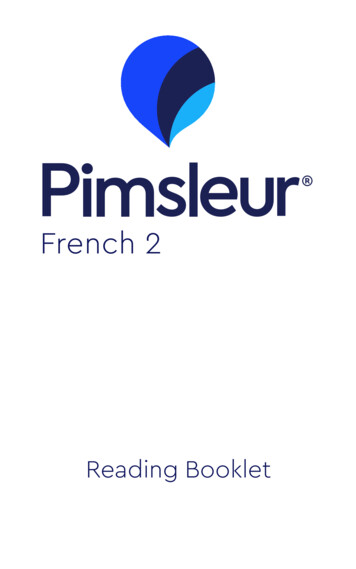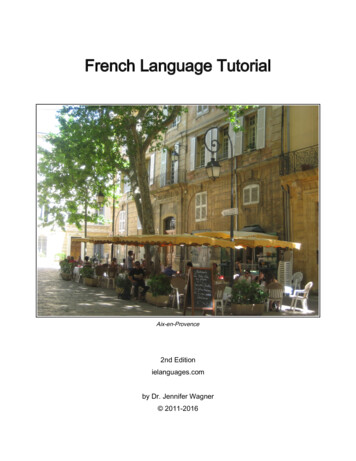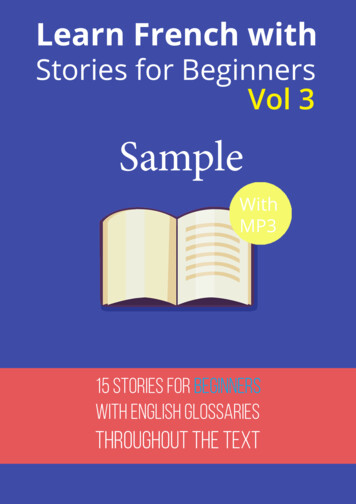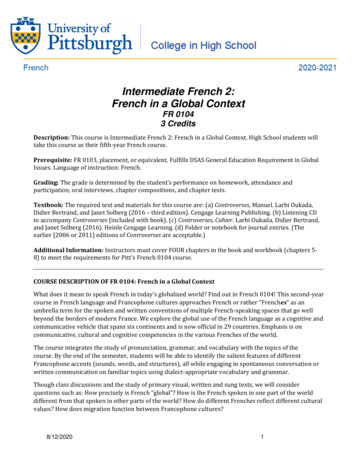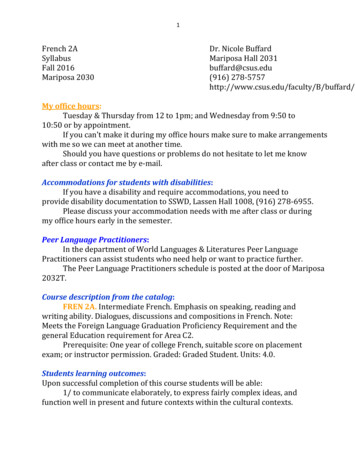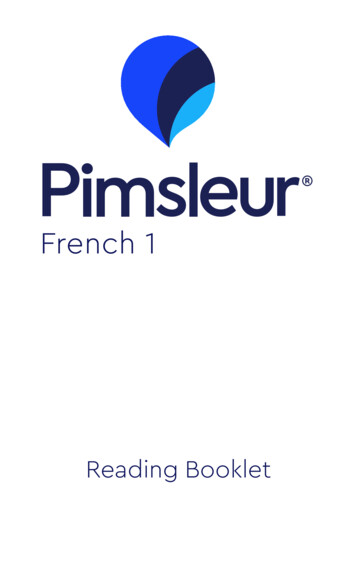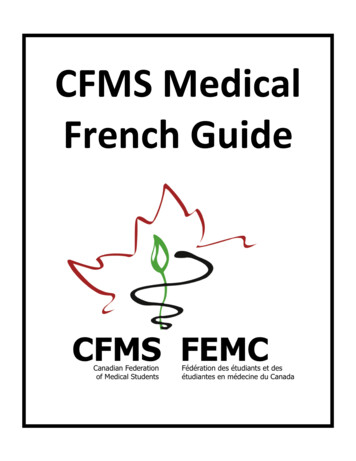
Transcription
CFMS MedicalFrench Guide
Collaborators:Etienne Leveille, Zahia Attari, Christine Audi, Mehdi Belbraouet, Christianne Blais, KylaFreeman, David Ji, Celia Kwan, Ève Mailhot, Kaylani SabanagayamINTRODUCTIONWelcome to the first edition of the CFMS Medical French Guide! In addition to helping you learnFrench by including valuable information and keywords, this guide will provide you withresources that will help you learn French. The guide includes six main sections:1) General tipsThis brief section does not include direct French teaching, but rather tips to facilitate yourexperience and maximize your learning. Some tips in this section are simple and can be used rightaway.2) ResourcesThe goal of this section is to give you a non-exhaustive list of useful resources that will help youbetter learn French. This includes formal learning tools but also apps, books and YouTubechannels that are both entertaining and educational!3) High yield informationPerhaps more advanced, this section focuses on important French details that do not exist inEnglish. There is also a list of false friends, which are French words that sound like English wordsbut have a different meaning than the one that you would expect. Additionally, this sectionincludes tips on spoken Quebec French. Unfortunately, we could not go into detail for every varietyof spoken French, so we decided to focus on Quebec French, which is the most commonly spokenvariety in Canada.4) Clinical scenariosThirteen clinical scenarios are included in this section. They are bilingual and are meant to be usedto practice history taking in French. The scenarios are usually focused on a specific goal, such astaking a sexual history or understanding how pain is described in French. The physician role ismeant to be played by the learner and the patient role by the tutor, but the opposite can be done aswell.
5) KeywordsIn collaboration with the McGill University Clinical French Club, this section was created toinclude a list of key medical words that are commonly used or confused. Each word is translatedin French and accompanied by a sentence that puts the word in a clinical context.6) Special pediatric sectionIn collaboration with the McGill University Pediatrics Interest Club, this section provides threeclinical scenarios and keywords that are focused on pediatric history taking and physicalexamination.We hope that this guide will be valuable and serve to improve your clinical French!Etienne LeveilleMcGill University, Class of 2021
1.General Tips toLearn FrenchLearning French is hard; it’s capricious and precise, with silent letters, different verb structures,and gender associated with each noun. Here you will find general tips to help you in yourjourney to learn this language.
Immersion is keyIf you have ever travelled to a foreign non-English-speaking country, you have probably alreadyexperienced it. Being immersed is one of the best ways to learn a new language. Studies haveshown that studying abroad is an efficient way of learning and perfecting one’s knowledge of anew language1.Do clinical rotations in FrenchDoing a rotation in a location where French is the primary language is a great way of immersingyourself in a francophone clinical environment. The best location to do so in Canada would be inthe province of Quebec, where the majority of the population is francophone. You can do a rotationat McGill University (which has a significant francophone population), Université de Montréal,Université de Sherbrooke, or Université Laval. Being in a francophone environment and meetingfrancophone patients can be greatly beneficial for your learning. Other provinces in Canada alsohave significant francophone populations such as New Brunswick and northern Ontario. If you arenot fluent in French, this experience will probably put you out of your comfort zone, but it willlikely be worth it. Patients typically appreciate the effort made to try to speak their native language.A good option with a patient who also speaks English is to start the interview in French and thenswitch to English for the more technical parts of the history.Go to your school’s French ClubIf there is a medical French club at your school, we encourage you to go to their events! They aretailored to give you practice and enrich your medical vocabulary while being a great opportunityto meet new people. For example, medical French clubs might organize history taking workshopswhere students are given scenarios to practice with a peer. Workshops can be tailored to specificorgan systems so that students can learn the vocabulary and sentences specific to it. Workshopscan also be aimed at improving communication skills for sensitive subjects like sexual history ormental health. These are some examples of the benefits that your French Club might offer you.Use technologyConsidering the omnipresence of technology and the fact that so much of language learning comesfrom repetition, making sure that all your devices are set to French is a good method to immerseyourself in a new language2.1 Kinginger, C. (2011). Enhancing Language Learning in Study Abroad. Annual Review ofApplied Linguistics, 31, 58-73.doi:10.1017/S02671905110000312Kim, Heyoung, and Yeonhee Kwon. "Exploring smartphone applications for effective mobile-assisted languagelearning." Multimedia-Assisted Language Learning 15.1 (2012): 31-57.
Changing your phone to FrenchChanging your phone to French is a good first step to getting used to some basic French words.All your apps like “Weather” will be changed to their French counterpart, in this case “Météo”.This can give you a basic exposure to some vocabulary. Apps like Siri and Google Assistant canhelp you practice speaking. This is certainly a step in the right direction.Change your search settings to FrenchSetting Google to French will give you results in French. For instance, this will lead you toWikipedia pages in French, adding another opportunity to optimize your learning.Like Facebook pages in FrenchYour Facebook feed can help you learn French. Facebook’s language can be changed to increaseimmersion. Multiple pages on Facebook can help build your vocabulary and grammar. This caninclude pages meant to teach French or simply pages in French, like news or entertainment ages.Label items at homeTransform your environment to facilitate learning. By labelling items at home in French, you willslowly and passively associate the object with the word. It is also useful to add “le” or “la” to yourlabels to familiarize yourself with the gender of words in French.Read in FrenchReading is fundamental to language learning. Not only is it helpful for learning sentence structureand grammar, it is an excellent source of vocabulary and idioms 3. Reading “Radio-Canada” insteadof “CBC News” will help you stay updated on current events while learning French. Dependingon your knowledge of French, reading French classics can be helpful while also helping you todiscover a new culture. A notable example is Le Petit Prince, which is one of the most famousFrench books, despite its simple grammar. You can refer to the “Resources” section of this guidefor more recommendations.Engage in conversations with Francophones around youReading is one thing, talking is another. Talking with native speakers is probably the best way topractice your spoken French. Tell people that you wish to improve your French and that you wouldlike them to correct you on your mistakes. Research shows that while formal learning helpsdevelop grammar and lexicon, students studying abroad develop better narrative abilities because3Nation, Paul. "Principles Guiding Vocabulary Learning through Extensive Reading." Reading in a ForeignLanguage 27.1 (2015): 136-145.
of the constant sociolinguistic pressure. You can also talk with people online; may it be ondedicated websites or in settings such as video games.Confidence and perseverance are keyLearning a language can be an anxiety-inducing experience, especially when interacting with morefluent or native speakers. People often fear being judged for their pronunciation, for their hesitancyor for their grammar. Studies have found that this anxiety is harmful to the student’s learning andperformance. Therefore, confidence is key. You should always keep in mind that learning a newlanguage is a way of bettering yourself, even if it can be hard. Remember that most people willappreciate the efforts you make trying to learn a new language. Learning a new language is also atask of endurance. It takes time. Don’t get discouraged by slow progression and always keep inmind what you have learned instead of what you don’t know.
2.ResourcesOne of the main goals of this guide is to give you an idea of the resources that are available tolearn French. In this section, you will find formal medical resources, apps, books, TV shows, andYouTube channels that might be helpful and enjoyable. The recommended level of Frenchrequired is included for each resource.
French Language ResourcesWebsites and dictionaries:Larousse / Le Petit Robert (All levels of French)Le Larousse and Le Petit Robert are the two most well-known French dictionaries.Le Robert: https://www.lerobert.comLarousse: https://www.larousse.frLinguee (All levels of French)Online French-English dictionary that translates terms and provides synonyms and sentenceexamples with the term in different contexts.https://www.linguee.fr@terminomed – Medical terminology on Twitter (Advanced French)Follow regular Twitter posts in French on medical terminology and other medical information.The author, Dr. Serge Quérin, goes in detail and explains medical terminology. This is for veryadvanced speakers such that even native speakers will learn from it.https://twitter.com/terminomed?lang enAssociation of Faculties of Medicine of Canada Franco Doc Tool Box (All levels of French)This toolbox provides many resources for students seeking to improve their medical French(including tools described in this guide). This includes links to terminology guides, professionaltraining opportunities, workshops, and c/franco-doc-tool-boxOffre active (Intermediate to advanced French)Website that includes many resources such as clinical case studies, guides on health-related topics(e.g. social determinants of health), and videos in French.http://cnfs.net/ressources/ressources/Bon Patron (All levels of French)Website that allows for correction of written French. They also give explanations about themistakes you make.https://bonpatron.comBonjour de France (All levels of French)Website that includes activities for practice on many subjects in French. The activities areorganized based on your level of proficiency in French.https://www.bonjourdefrance.comRfi Savoirs (Intermediate to advanced French)Website that includes activities and podcasts for practice on many subjects in French. Includes ahealth section.https://savoirs.rfi.fr/en
TV5Monde (All levels of French)Website that includes activities for practice on many subjects in French. The activities areorganized based on your level of proficiency in French. Also includes a health icationsVa te faire conjuguer (All levels of French)App for the rapid conjugation of French verbs. Includes an extensive list of verbs with all relevanttenses.Duolingo, Memrise, Babbel (Beginner to intermediate French)Apps for learning French. Customizable based on personal goals and current level of French.Med Interpret (All levels of French)App for translating medical terms and phrases to French. The app is well-organized and includesaudio pronunciation of the words.Manuel MSD (Advanced French)Merck manual app in French (can also be downloaded in English) that provides medicalinformation on conditions, symptoms, treatments, and etiologies. For optimal understanding, youcan download both language versions and learn content in French and in English simultaneously.Prognosis (Intermediate to advanced French)This app provides clinical case scenarios for users to work through as practice. Cases are availablein several languages including French and English. In addition to learning French, it is also usefulfor learning and applying medical concepts.DocumentsInterpretation guide for professionals in health care (All levels of French)Downloadable guide providing English-to-French translations of common medical questions anddescriptions of medical symptoms.www.accueilfrancophone.com/images/Doc Uploads/InterpretationGuide.pdfVideosSoigner en français, ça me parle (All levels of French)Videos featuring simulated patient interviews to familiarize yourself with medical terms andinterviews in French.web3.med.uottawa.ca/cnfs/capsule linguistique/capsules.phpMembershipsMédecins francophones du CanadaAs a medical student, you are entitled to a free membership with Médecins francophones duCanada. Such a membership gives you access to several resources, including their French
newsletter and a free membership to SOSCuisine, an online service that facilitates meal planningand provides r.htmlPodcastsPodcastFrançaisFacile (All levels of French)Website encompassing many podcasts for various levels of proficiency in t Français Authentique (Intermediate to advanced French)Podcasts on French subjects. Most suitable for intermediate and higher proficiency ainmentThis section is far from being comprehensive but will definitely give you a few ideas if you arelooking to learn French while having fun. This is also a good way to get to learn about thefrancophone culture.Movies/FilmsComedy-drama Bienvenue à Marly-Gomont (The African Doctor) Intouchables (The Intouchables) Gaz Bar Blues Monsieur Lazhar Continental, un film sans fusilAction Bon Cop, Bad Cop (1 & 2)Animated Astérix – Le Domaine des Dieux (Astérix, The Mansion of the Gods)Drama Ce qu’il faut pour vivreC.R.A.Z.Y.Dédé à travers les brumesEmporte-moiIncendiesJ’ai tué ma mèreL’ange de goudronLa neuvaine
Comedy Les invasions barbaresPolytechniqueMommyJuste la fin du mondeRebelleLa grande séductionLe dîner de consAstérix et Obélix : Mission CléopâtreBienvenue chez les Ch’tisCruising barFor more suggestions, see the links lm/francaisTV ShowsMedical documentary De garde 24/7Thriller La ManteBlue MoonComedy Au service de la France (A very secret service)La GalèreDans une galaxie près de chez vousLes BougonLéoLes magnifiquesDrama Mémoires vivesLes pays d’en hautFortierUnité 919-2Minuit le soir
District 31L’ÉchappéeRupturesVictor LessardPlan BDemain des hommesComedy-drama Les invincibles Rumeurs Série noire Les Simone M’entends-tu? Appelez mon agent (also known as « Dix pour cent »)For more suggestions, see the links rie télévisée québécoisehttps://fr.wikipedia.org/wiki/Liste de téléromans eries/meilleures/pays-5001/Radio and NewsRadio-CanadaChoose from a range of programs in French, including interviews and news coverage on diversetopics as well as French music. French equivalent of .comChoose from a wide selection of French radio stations (from France), all accessible for free online.https://ecouterradioenligne.comQuébec Radio StationsChoose from a wide selection of French radio stations (from Québec), all accessible for free ebecYouTube ChannelsMost popular Youtube channels in France1. Squeezie2. Cyprien3. Norman Fait des Vidéos4. Tibo InShape5. Amixem6. Natoo
7. Le Rire Jaune8. McFly et Carlito9. SEB10. Le Bled’ArtMost popular francophone Youtube channels in Québec1. CB Games2. Nabile « Aiekillu » Lahrech3. Steelorse4. girlyaddict5. Cynthia Dulude6. Mahdi Ba7. Emma Verde8. Cath & Jay9. SolangeTeParle10. Thomas GauthierLes chaînes YouTube culturelles et scientifiques francophonesVery comprehensive document created by the French Ministry of Culture. It includes more than350 francophone YouTube channels dedicated to science and culture. The channels are organizedin categories such as history, economics, music, and 0Youtube.pdfBooksMedical texts/Livres médicaux (Advanced French) Le petit Larousse de la médecine Précis de terminologie médicale Le manuel MerckFrench-language texts (All levels of French) Livres Français Langue Étrangère (FLE)Different books appropriate for different levels of FrenchFor pleasure (Mostly advanced French) Le Petit Prince (Antoine de Saint-Exupéry) Maria Chapdelaine (Louis Hémon) L’énigme du retour (Dany Laferrière) Un homme et son péché (Claude-Henri Grignon) Bonheur d’occasion (Gabrielle Roy) Six degrés de liberté (Nicolas Dickner) Les belles-sœurs (Michel Tremblay)
L’homme rapaillé (Gaston Miron)Grosse femme d’à côté est enceinte (Michel Tremblay)Amun (Michel Jean)La bête à sa mère (David Goudreault)Les misérables (Victor Hugo)Le comte de Monte-Cristo (Alexandre Dumas)L’Étranger (Albert Camus)Voyage au bout de la nuit (Louis-Ferdinand Céline)Gagner la guerre (Jean-Phillipe Jaworski)En attendant Bojangles (Olivier Bourdeaut)Ceux qui restent (Marie Laberge)For more suggestions, see the links es meilleurs livres esultats/Les classiques de la litterature jeuneshttps://fr.wikipedia.org/wiki/Les cent livres du siècle
3.High YieldInformation AboutFrench
Tricky differencesGeneral Grammar rulesThere are important differences in French grammar compared to English grammar. Here are someof the most important distinctions:Verbs-There are 3 past tenses in French: imparfait, passé composé and passé simpleo Imparfait is used to describe past events or to “set the scene”o Passé composé is used for specific events that took place at a specific timeo Passé simple is mostly used in formal writing-Reflexive verbso Unlike in English, in French, a reflexive pronoun is necessary: the pronoun isrepeated when something is performing an action on itselfo E.g: «Je me brosse les dents», meaning “I myself brush my teeth”-Future and conditional tenseso French has distinct conjugations for many verb tenses, including the future andconditional tenses. Just like in English sentences, French verbs are sometimespaired with helping verbs like “will” or “would” to signify the future. However,French verbs also have their own future and conditional forms that must be usedinstead of a helping verb verb. For instance, «j’irai» is “I will go”, which is futuretense, and «j’irais» is “I would go”, which is the conditional tense.Nouns and Adjectiveso Every noun is either masculine or feminine and singular or plural, and adjectivesand articles must agree with the nouns in both gender and plurality.o Adjectives usually go after nouns instead of before. So, it’s “a green car” in English,but «une voiture verte» in French. The only exception is a handful of very commonadjectives, including «bon», «nouveau», and «grand».o In French, language names, months and days of the week do not start with a capitalletterFor more details on French grammar, see the links below:https://en.wikipedia.org/wiki/French p://www.languageguide.org/french/grammar/
French False FriendsFalse friends are foreign words and expressions that seem to mean one thing because of theirsimilarity with another word in a certain language, but actually mean another. In other words, it’swhen French words look like English words, but they don’t actually mean the same thing.Here’s a list of certain words and expressions that you might hear when encountering Frenchspeaking patients or colleagues (or even in your everyday life).Word in FrenchTrue meaning (in English)MédecineThe medical fieldSome patients would say itreferring to blood pressure orhypertension(mainly infers) recreationaldrugsSensitiveA readingArmInternshipManagerInjuredTo take an examTo sséPasser un tment, beingdisappointed, to ifGraveTanné (québécois french)To wish/desireDayBookshopRentalCondomSomething seriousBeing fed upWhat it can be mistaken forin EnglishMedicine/medicationTension (the force)MedicationSensibleLectureBras (underwear)Stage to perform onA sponsorBlessedTo pass an examTo attend to someoneDeceit, somebody accusinganother person of deceivingthemTo envyJourneyLibraryLocation, a placeFood preservativesGraveTannedYou can find more examples in the link pendix:Glossary of false nglish-false-cognates-faux-amis-1364675
Contractions and special formulations in Quebec FrenchIn Québec, French tends to be spoken differently from formal French. Many expressions and waysof pronouncing words and sentences are unique to the Quebecois culture. For instance, peopleliving in the province of Québec tend to use contractions when saying certain phrases. Here are afew examples:Formal French Expression«Je ne sais pas»«Je suis»«Je suis all黫Tu sais»«Puis»«Je veux»«il»«elle»«Plus»«Bien»«Ce qui fait que»«À cette heure»«À un moment donné»How it’s pronounced in québecois French«Ché �y»«Il veut parler» «Y veut parler»«a»«Elle veut boire» «A veut boire»Also, sometimes, the pronoun «elle» iscompletely omitted«Elle était belle» «Était belle»«Pu»«Ben»«Faque»«À ct’heure»«À manné»Sometimes, articles (mainly «la» or «le») before nouns are omitted:Formal French Expression«Je vais à la maison»«Sur la table»«Je vais sur le balcon»How it’s pronounced in québecoisFrench«Je vais à maison»«S’a table»«Je vais su’l balcon»The negation article «ne» is also omitted most of the times:- «Je ne veux pas manger» becomes «Je veux pas manger»
Vous vs tuIn French, a plural “you” exists: “vous”. Typically, “tu” is used for addressing a single person, and“vous” is used for addressing more than one. However, when addressing a single person moreformally (such as a patient or a superior), “vous” rather than “tu” is sometimes preferably used toshow politeness and professionalism.For example, “comment vas-tu?” becomes «comment allez-vous? ».A general rule of thumb is to use “vous” when you are not sure since it is more formal.Addressing someone with « tu » is called tutoyer and with « vous » is called vousvoyer. Someonethat you use « vous » with might tell you «Tu peux me tutoyer », which means that they want youto use « tu» with them.See the links below for more ammar/tu and nouns-tu-vs-vous/Commonly used slang in Quebec FrenchSlangJe suis écoeuréeJaserPas pirePlatePiasseAvoir de la misèreNiaiserÉcoeurantPantouteDe mêmeMeaning(s) in EnglishI’ve had enoughTo talk, to discussIt wasn’t that badBoringSomething sad/disapointingDollarsHaving difficultyFooling aroundWasting timeMaking fun of something/someoneCould mean both something amazing or canqualify someone of being annoying(depends on the context)Not at allLike so, as suchYou can find more examples in the links below:https://en.wikipedia.org/wiki/Quebec French stiques/expressions-quebecoises/
Particularities of the Québecois accent-[A] becomes [o]o La loo Elle ne l’a pas Elle l’a po-[O] sounds is pronounced [o-w]o Faute F[o-w]te-The sound [oi] becomes [oé]o Moi Moé-[En] tends to be more pronounced as [ein] (compared to the French spoken in Europe)o Tellement tellem[ein]-[Tu] sometime sounds like [tsu]o The [t] sound at the end of certain words is sometimes omittedo Dentiste Dentisso Correct CorrecFor more details:https://en.wikipedia.org/wiki/Quebec French ench/
4.Clinical Scenarios1. Oncology2. Alcohol Abuse3. Chest Pain4. Smoking Cessation5. Headache6. Geriatrics7. Neurology8. Urology9. Hypertension10. Psychiatry11. Immigrant Health12. Pre-operative assessment13. Sexual Health
OncologyContexte à donner à l’étudiant en médecine : Mon nom est Marie, j’ai 62 ans et je suis ici dans votreclinique sans rendez-vous, car j’ai trouvé une masse dans mon sein il y a 4 mois.Context to give to the medical student: My name is Marie, I am 62 years old and I am here in your walkin clinic because I found a mass in my breast 4 months ago.Histoire de la maladie actuelle :La masse a été trouvée par le patient il y a 4 mois : elle est non-douloureuse et ne fluctue pas avec lesmenstruations, mais elle s’élargit. Pas d’antécédents de traumatismes ni de blessures sur le sein. Pas defièvre ni de fatigue ni d’une perte de poids involontaire ni de sueurs nocturnes.Examen physique : Pas d’érythème, ni d’écoulement du mamelon, ni de capitonnage de la peau. L’examendes ganglions lymphatiques est négatif. La dernière mammographie, qui a été faite il y a un an, étaitnormale.History of present illness:Mass found 4 months ago by patient: non-painful and does not fluctuate with menses, but it is growing insize. No history of trauma or breast wounds. No fevers, unintended weight loss, night sweats.On physical exam: palpable, nontender mass in upper outer quadrant of right breast, measuringapproximately 2cm x 3cm. No breast erythema, nipple discharge, or skin dimpling. Lymph node exam isnegative.Last mammogram done 1 year ago was normal.Antécédents médicaux:SurpoidsDiabète de type 2Tante paternelle décédée d’un cancer du sein à 75 ansMal de dos chroniquePast medical history:OverweightType 2 DiabetesPaternal aunt died of breast cancer at age 75Chronic back painMédicaments/Medication: Metformin (diabetes)Habitudes:N’a jamais fuméBois un verre de vodka 1-2 fois par semaineHabite un appartement avec son filsHabits:Has never smokedDrinks a glass of vodka 1-2 times per weekLives in an apartment with her sonQuestion du patient (à poser au docteur)Est-ce que j’ai le cancer du sein?J’ai entendu dire qu’il y a des traitements hormonaux pour le cancer du sein. Est-ce que j’ai besoin dechimiothérapie ou d’une mastectomie tout de même?Comment est-ce qu’on peut savoir si le cancer s’est répandu?Patient’s question (to ask to the doctor)Do I have breast cancer?I heard there are hormonal treatments for breast cancer. Do I still need chemotherapy or a mastectomy?How do we check if the cancer has metastasized?
Alcohol AbuseContexte à donner à l’étudiant en médecine : Mon nom est David, j’ai 51 ans et je suis ici dans votreclinique sans rendez-vous car j’ai des douleurs abdominales depuis 4 mois.Context to give to the medical student: My name is David, I am 51 years old and I am here in your walkin clinic because of abdominal pain I’ve had for the last 4 months.Histoire de la maladie actuelle :Douleur dans le quadrant supérieur droit depuis 4 mois : la douleur irradie parfois à l’omoplate droite, etest d’environ 5/10. La douleur s’empire après la consommation d’alcool, mais le patient ne pense pas qu’ila problème d’alcool (le patient le nie agressivement). Il boit chaque matin avant d’aller au travail, à sontravail, et quand il revient à la maison. Sa consommation a augmenté au cours des trois dernières années etaffecte sa productivité au travail.Pas de fièvre ni de fatigue. Aucune perte de poids.History of present illness:Pain in the right upper quadrant for the past 4 months: pain that occasionally radiates to the right shoulderblade, and is graded 5/10. The pain is worse after he drinks alcohol, but the patient does not think he has adrinking problem (he aggressively denies this). He drinks in the morning before going to work, at work,and when he comes home. His drinking has slowly increased over the last three years and has decreased hisproductivity at work.No fever, fatigue or weight loss.Antécédents médicaux:SurpoidsHypertension et hypercholesterolémieReflux gastro-esophagienDiabètePast medical history:OverweightHypertension and hypercholesterolemiaGastro-esophageal reflux disorderDiabetesMédicaments/Medication: hydrochlorothiazide, statin(e)s, Tums, metforminHabitudes:Fumeur: 1 paquet par jour depuis 30 ansBois 2 bouteilles de vin par jour (ne l’admet pasdirectement)Ne fais pas d’activité physiqueHabits:Smoker: 1 pack a day for the last 30 yearsDrinks 2 bottles of wine per day (does not admitit directly)Is not active physicallyQuestion du patient (à poser au docteur)Qu’allez-vous faire avec moi? Quels tests allez-vous faire?Est-ce que mes symptômes sont liés à mon diabète?Est-ce que j’ai le cancer du foie?Patient’s question (to ask to the doctor)What will you do next? What tests will you do?Is this
discover a new culture. A notable example is Le Petit Prince, which is one of the most famous French books, despite its simple grammar. You can refer to the ³Resources section of this guide for more recommendations. Engage in conversations with Francoph
